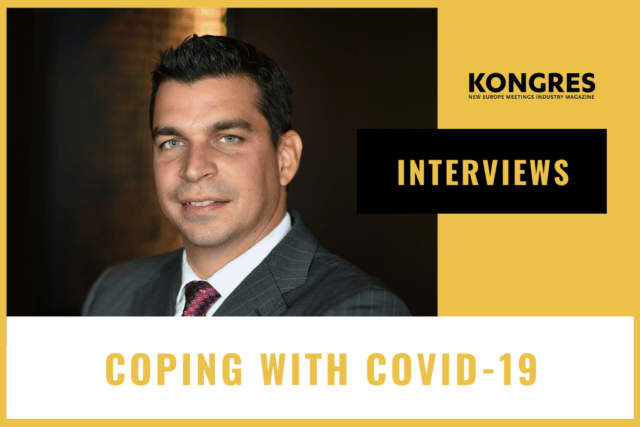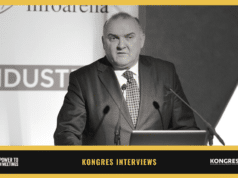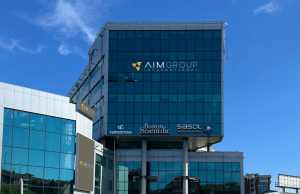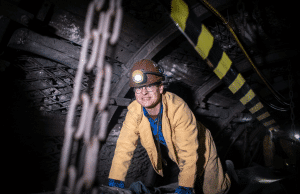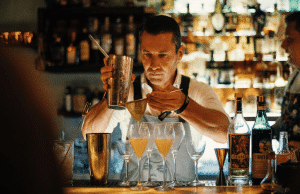In these challenging times, Kongres Magazine is trying its best to provide meeting planners with the most relevant and useful information regarding the spread of COVID-19. We also want to share opinions from key members of the meetings industry.
We asked key opinion makers from the meetings industry for their thoughts on the situation and how they are coping with COVID-19.
MILOŠ CEROVIĆ, General Manager at InterContinental Ljubljana
ALTERNATIVE SOLUTIONS FOR A NEW NORMAL
Q: How do you feel about the restrictions that European governments have implemented to contain the spread of COVID-19?
We surely concur with these measures and are trying to adapt them to our businesses the best we can. Safety of our guests, employees and other key stakeholders has always been at the centre of our focus hence it was no different this time around.
Q: What would you compare this situation to?
Unfortunately, there has never been a situation in the past that had such an impact on the global economy. We can somewhat compare this crisis to 2008/2009 however the magnitude and scale of this present time is way bigger than anything that we have seen in the past 20-30 years.
Q: Economic consequences for the meetings industry have already started to show, what do you expect government institutions to do?
We are very pleased with the government’s aid thus far. We are hoping that the government measures and subvention packages for the HORECA industry will not stop now. Once we start experiencing the upward shift, I would expect that the government heavily invests in tourism, both congress and leisure.
Q: What is your opinion on virtual meetings, as an alternative to live events?
They keyword is “alternative”. Nothing can replace a genuine face to face conversation and a first-hand experience of a city, venue and a networking event. However, it is what it is, and we now see that distant meetings can be effective and serve the purpose without people travelling and incurring extra costs and time. The sooner we accept that virtual meetings will play a major role in the future of our business the better off we will be.
Q: What precautions/measures are you taking in your company?
At the moment, most of our measures are being focused on the safety of our employees and guests. The InterContinental Hotels Group came up with a completely new set of cleaning standards, that are even stricter than the previous ones that were already at a high level. The group is also working closely with the owners’ association to ensure that our owners can financially survive this crisis. Some operational brand standards were relaxed and certain services that IHG provides to the owners were discounted during this time. Those hotels that remained open are very active in the community, assisting healthcare workers and those in need of a safe and comfortable accommodation.
Q: What are your expectations regarding the duration of the crisis and when will the situation go back to normal?
Looking at statistics and forecasts from the industry-leading research firms, all the data we have now are showing a tough recovery road ahead of us. I believe that 2021 will be a recovery year and that 2022 will more or less equal 2019. However, it is still too early to make any intelligent assumptions without understanding what “new normal” looks like.
Q: How are you tackling the event prohibition? What will the next few months look like for you?
We are leveraging this downtime by investing in our virtual meeting platform which will enable our guests and clients to visit our website and receive a full hotel tour, including the meeting venues and congress centre. We are also in proactive and reactive communication with meeting planners who are showing an interest in visiting Slovenia.
Q: What can we do to help our industry get back to its feet as soon as possible?
Continue promoting Slovenia as a meeting destination that offers great scenery, quality hotels and meeting facilities and one of the best values for money.
Q: Are you foreseeing any problems for the meetings industry once the prohibition is lifted?
It all depends on what “new normal” looks like. It is too early to speak about it since we are not at the conclusion point of this crisis as of yet. Until we understand what the safety standards will looks like and what changes will be made to the airline business, it is very hard to predict the future of the meeting industry. I surely hope that we will find a way to keep the guests safe while continue to offer and provide quality meetings and events.
Q: What does this mean for events in the future? What will have to change?
It means that our industry will have to adapt to the changes and those related to safety and cleanliness to start with. Virtual meetings will have to be an integral part of all businesses and technology will keep playing an essential role in our day to day routine.
SHOWING CARE AND SHARING INFORMATION IS ACCEPTABLE AND HIGHLY APPRECIATED
Q: Is marketing (digital marketing) in the duration of the pandemic sensible (and appropriate)?
I believe so, for as long as it is not aggressive. Showing care and sharing information is acceptable and highly appreciated by the clients and guests. Active sales can be seen as an insensitive way to promote your business.
Q: What will happen after we’ve beaten the virus? How will you (re)start your marketing activities?
Staying positive and sharing energy with our clients will be our top priority. Making them confident in our safety measures and reminding them of fond memories they had with us in the past or could have if they decided to visit our property. This will be the key.
Q: Are you in contact with colleagues from around the world? Have you talked about any potential solutions?
Being part of a large, international chain enables me to exchange best practices with my internal peers from the InterContinental Hotels Group. On top of that, I am subscribed to many industry-leading magazines and networks for the reason of staying up to date with the latest standards, innovation and solutions. Networking is very important in any business, let alone ours which is essentially based on constant interaction with guests and colleagues.


